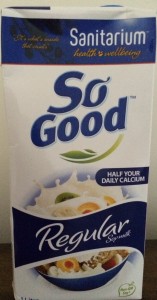If you have IBS and are lactose intolerant, what milk can you have?
In a different post I researched and wrote about lactose intolerance and what that means for IBS sufferers.
Here I am going to look into lactose-free and low FODMAP milk options, following the information and recommendation of Monash University (Monash University app, iPhone version November 2015).
Lactose Free Does Not Mean Low FODMAP
Not all lactose free milks are low FODMAP and therefore suitable for IBS. Let’s see which ones are and which ones are not. In all cases, read the ingredients, just in case high FODMAPs ingredient such as inulin (e.g. chicory root), fructose etc. have been added to these lactose free milks.
As always try small quantities first, to see if you can tolerate these milks or not.
This list has been updated on the 16/05/2016 following Monash University announcement that rice milk is now low FODMAP up to 200 ml (4/5 cup, 7 fl oz).
Lactose Free Cow’s Milk – Low FODMAP
This is normal cow’s milk, which gets ultra-pasteurized and where small quantity of the lactase enzyme is added to break down the lactose, so that lactose intolerant people can still have it. The lactase makes the milk taste sweeter than ordinary milk, but it contains the same proteins and calcium.
Any Other Animal Milk – High FODMAP
All animal milk contains lactose. If you consume goat, sheep or buffalo milk, and you have lactose intolerance, you will get those nasty symptoms, unless of course you have the lactose free version.
Soy Milk
-from soybeans (high FODMAP)
-from soy protein (low FODMAP)
The Soy Milk made from whole soybeans is a healthy lactose free milk with high quality protein and nutrients, but unfortunately it is high in the Oligos-GOS and therefore high FODMAP and not suitable for IBS sufferers. On the contrary, soy milk made from isolated soy protein, it’s safe for IBS sufferers (tested quantity up to 1 cup or 250 ml), although it is a more refined and processed food compared to the one made from whole soybeans and naturally does not contain the same nutrients (which are usually added in).
Oat Milk (high FODMAP)
Oat milk is made from oat groats, hulled grain that is broken up into fragments, combined with water. This mixture is boiled and simmered and once cooled and strained, forms oat milk. Plain oat milk has a very mild, slightly sweet flavour. Oat milk contains gluten, which is not a problem if you are not coeliac or allergic to gluten.
Coconut Milk (small serving is low FODMAP)
From a can or long life (UHT) – low FODMAP (125 ml or 1/2 cup)
This milk can be a delicious alternative to milk, especially in cakes, pancakes and most sweet recipes that require milk. It is made from the pulp of mature coconuts. The meat of the coconut is generally grated and then squeezed through a cheesecloth to make the real thick and creamy coconut milk. What is left is soaked in water and squeezed to make milk that is thin. Coconut milk doesn’t have much protein and it is quite fatty in saturated fat.
There is a big debate around the topic of coconut products like milk and oil being good or bad because of the high percentage of saturated fat and even experts are not too clear on that and you may want to look into it more yourself.
For what the FODMAPs are concerned, coconut milk from can or UHT longlife, is considered a low FODMAP milk up to 125ml or 1/2 cup.
Almond Milk (low FODMAP 1 cup, 250 ml)
Almond milk is rich in in nutrients such as calcium, magnesium, selenium, manganese, potassium, iron, phosphorus and zinc, as well as vitamins D and E, but not very rich in protein. The process consists in soaking the almonds in water and then add more water and blend it all together. The paste is then strained and what is left is the almond milk.
Hemp Milk (low FODMAP 1 cup, 250 ml)
Hemp milk is a plant milk, which is made from soaking hemp seeds in water than grounding them in a blender. The milk can then be refined by pouring it over a cheesecloth. This unprocessed version of the milk needs to be kept in the fridge and consumed within a week.
It can sometimes be found in health food store, although I haven’t been able to find it yet.
Avoid larger servings (>300ml) as it contains moderate amounts of Oligos-GOS.
Rice Milk (low FODMAP 4/5 cup, 200 ml)
Rice milk can be prepared in different ways. It can also be made at home, by rinsing the rice under water, before boiling it and when the rice is soft, it needs to be blended. At this point the mixture is strained through a cheesecloth and the liquid that goes through is the rice milk, which can be stored in the fridge for a few days.
Rice milk is high in carbohydrates and low in protein, often it is fortified with minerals and vitamins to make it more nutritious. Rice milk has recently been re-tested by Monash University (may 2016) and it’s low FODMAP.




Hi! I wonder why the oat milk is a high food map?
And one more question, I am not allergic to gluten but I should avoid it a little but isn’t there a pretty small amount of gluten in things made of oats. Like rolled oat and in this case oats milk? Since I’m not allergic but want to eat according to the foodmaps? 😀
Hi Linnéa, thank you for your comment. Oat milk has been tested by Monash University to be high FODMAP (only a small serve of 30 ml or 1/8 cup is low FODMAP). This is not due to the gluten, which is not a FODMAP and therefore not an issue, but because it contains Oligos-GOS which are FODMAPs. Rolled oats is low FODMAP only up to 1/2 cup or 52 g, but for 1 cup (105 g) becomes high in Oligos-fructans and GOS, again nothing to do with the gluten. So as long as you only consume 1/2 cup of rolled oats, you should be ok, but again we are all different. I can tolerate a bit larger quantities of rolled oats now, but you will have to check your own level of tolerance. Let me know how you go. Here is an article on gluten that you may find useful: https://www.lowfodmapdiets.com/gluten-free-diet/ xLarah
My mother drinks silk milk, I believe it is called. I never had a huge issue with milk but I don’t use it all that often. I think a big issue with her IBS is stress induced. This is why she can’t ever pin point what is causing the problem. She don’t want to hear it though. I know from personal experience that milk, eggs, cheese can cause issues, but stress can do 10x’s the damage.
Silk is an American brand of dairy substitute milks, mainly soy milk, but also almond and coconut milk. Soy milk made from soy beans is high FODMAP milk, check if that is what your mum consumes. Yes indeed stress is one of the biggest culprit in IBS flare-ups.
My friend makes soy milk at home! She finds it to be much more convenient and better economically to make it at home.
Hi Heather, yes I know a lot of people do, but IBS sufferers can only have the soy milk from the soy protein, not from the soy beans. There are a lot of different alternatives out there. Personally lactose free cow milk, almond and coconut milk are my favourites.
An informative writeup, i try it most on the list. since i have only been diagnosed with IBS and i am not allergic to gluten then the oat milk is a go for me
Hi Nicolas, I am also glad that I can have oat. I don’t really mind the milk, but I make really nice oats pancakes. You should try them.
great to see you have posted the low FODMAP alternatives for milk. seems the coconut milk can not be made at home but i will be sure to try out the rice milk, think i will find it plesant. Thanks
HI Megan, you could make coconut milk at home, if you wanted. Let me know how it goes with the rice one, if you make it.